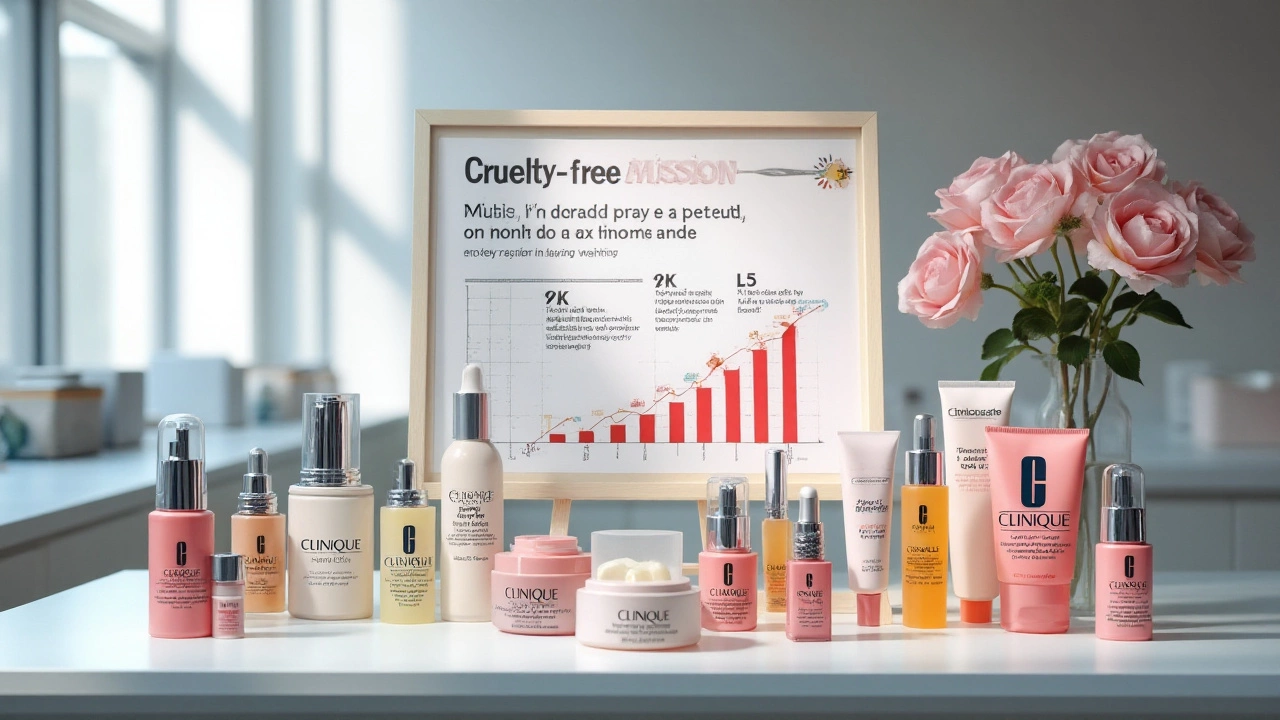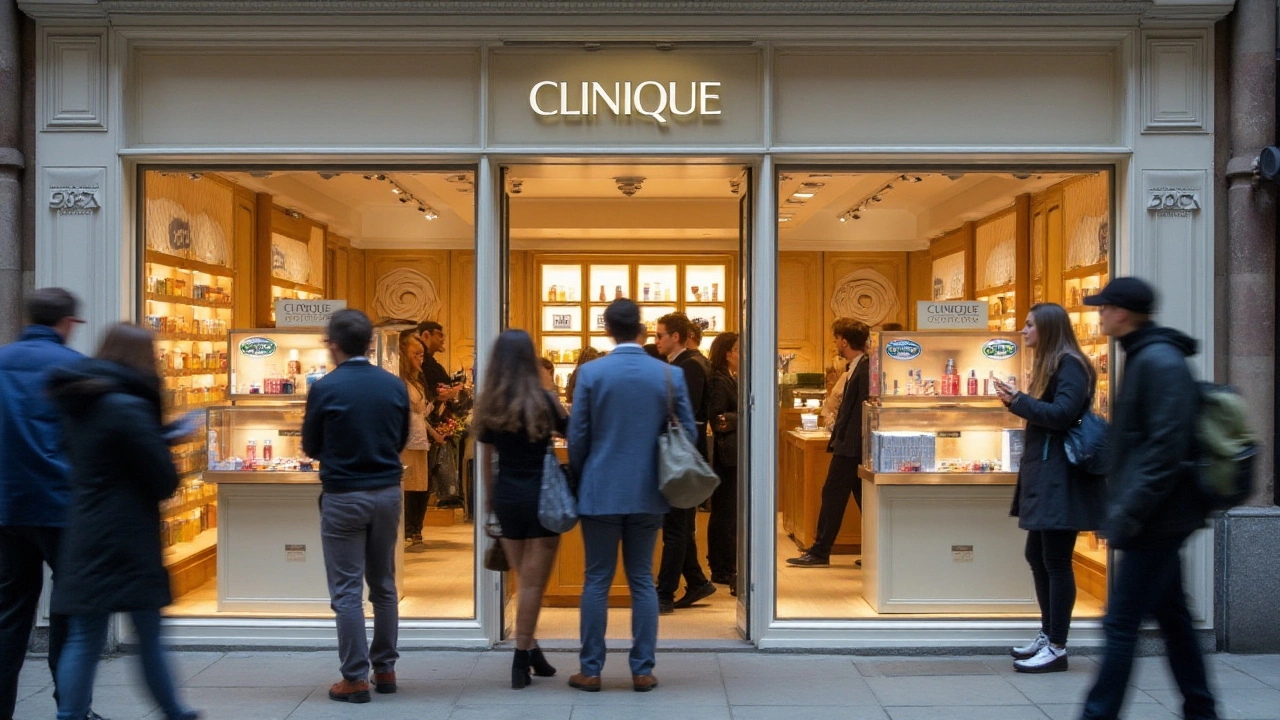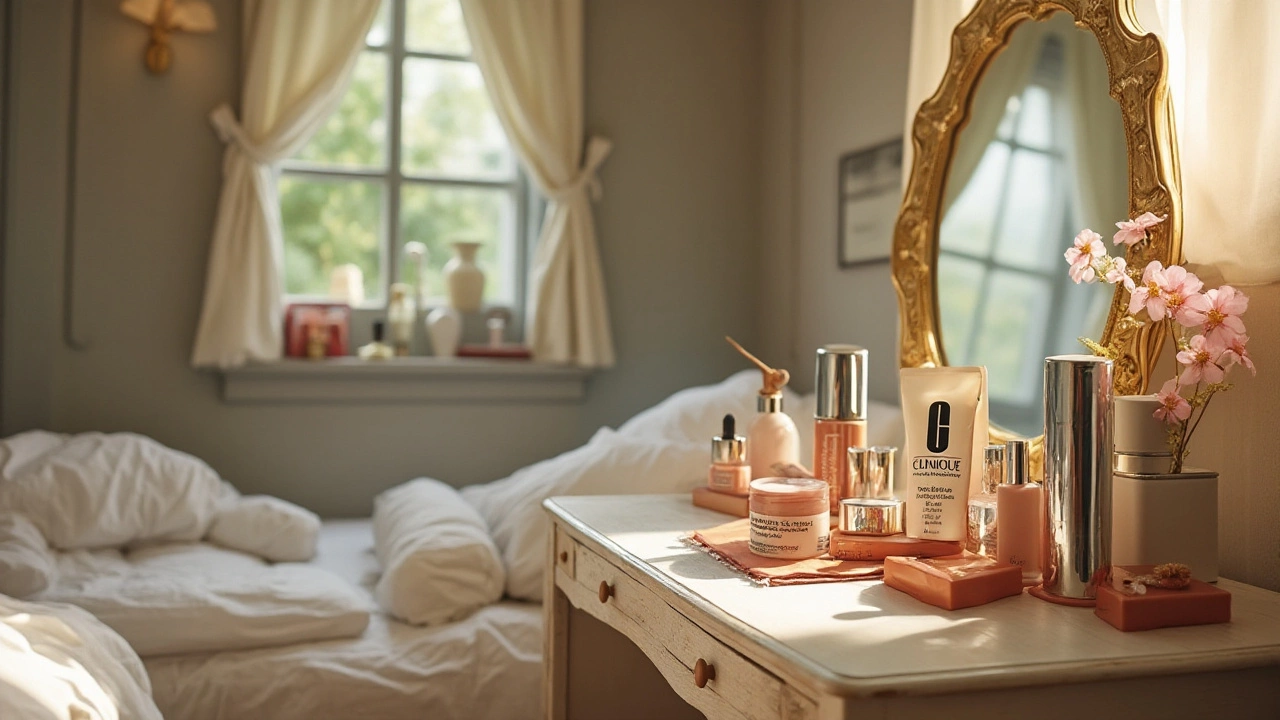Is Clinique Finally Joining the Cruelty-Free Movement?
 Dec, 4 2024
Dec, 4 2024
In recent times, the beauty industry has been transforming rapidly as consumers heighten their awareness and demand more ethical practices from their beloved brands. One of the brands caught in this wave of change is Clinique, a household name with a long-standing reputation for skincare and makeup products.
With an increasing call for transparency, it's crucial to understand where Clinique currently stands in terms of being cruelty-free. Many consumers are curious if old practices have been left behind and if they are now pioneers in responsible beauty. This article delves into Clinique's journey and the commitment—or lack thereof—toward eliminating animal testing from its product lineup.
As we dig deeper, we also explore the broader movement within the beauty industry and what steps companies, including Clinique, need to take to truly meet the standards of conscious, caring consumers worldwide. Whether you are a dedicated follower of Clinique or an advocate for animal rights, this discussion offers insights into what the future holds for ethical beauty.
- The Current State of Clinique's Practices
- Consumer Pressure and Changing Trends
- Legal and Ethical Considerations in the Beauty Industry
- Alternatives to Clinique for the Cruelty-Free Shopper
- Steps for Brands Transitioning to Cruelty-Free
The Current State of Clinique's Practices
Clinique, like many legacy brands in the beauty landscape, has been under increasing scrutiny regarding its stance on animal testing. While many brands have declared themselves as cruelty-free, the path toward a clear and transparent policy is often murky. As of the latest updates, Clinique has declared that it does not conduct animal testing on its products, except where required by law. This exception particularly pertains to the Chinese market, where animal testing has historically been mandated for imported cosmetics. However, there has been a shift since China began introducing alternative testing methods as part of a pilot program. This means that previously mandatory animal testing might phase out, provided Clinique leverages non-animal test data effectively.
Clinique’s parent company, Estée Lauder, posted on their website that they are actively working towards advancing the science behind alternative testing methods. They support global research efforts and innovations that aim to eliminate the need for animal testing altogether. This is a significant commitment, suggesting that Clinique, under its parent company's guidance, is moving in a direction towards aligning with ethical beauty products. While this might seem like a positive step, it's essential for consumers to understand that the brand's cruelty-free status is not absolute, as the 'except where required by law' clause presents a hurdle.
One might wonder if the brand would lose its consumer base due to these practices. According to a survey by the Humane Society, 67% of global consumers consider themselves socially conscious, with a strong inclination toward choosing cruelty-free makeup. Clinique must balance remaining loyal to its global consumer base while addressing the ethical concerns associated with animal testing. During interviews, brand executives often point to their growing portfolio of products that are manufactured entirely without animal testing.
"Clinique's ambition is to welcome a future where beauty truly meets conscious consumerism," said a spokesperson during an industry conference last year.
The challenge remains, however, that in regions like China, where direct sales significantly influence profit margins, altering a longstanding policy is neither rapid nor straightforward. This has fostered significant debate within the beauty industry about brand responsibilities and consumer expectations. As we look ahead, it becomes apparent that companies like Clinique need to not only advocate for change but also transparently communicate intentions and updates with their audience.
An aspect that consumers should consider is the reliability of third-party certifications, such as Leaping Bunny or PETA's Beauty Without Bunnies program. These certifications can provide additional assurances about a company's commitment to cruelty-free practices. Despite the numerous challenges, there is optimism among stakeholders as the demand for truly cruelty-free products continues to grow. As Clinique tentatively adapts its practices to meet consumer demand for transparency, industry observers will be watching closely to see if promises turn into fulfilled commitments.
Consumer Pressure and Changing Trends
In a world where social consciousness and transparency reign supreme, today's consumers wield unparalleled power. Their collective voice has pushed for a seismic shift in the beauty industry, demanding that giants, including Clinique, reconsider their practices. The clamor for cruelty-free products is not just a fleeting trend but a deep-rooted movement driven by a generation keenly aware of ethical implications. Predicated on the belief that beauty should never come at the cost of animal life, this shift embodies a powerful statement against outdated practices. The surge in ethical beauty's popularity stems partly from increased access to information, allowing consumers to make informed choices and hold brands accountable.
Specific statistics paint a compelling picture; according to a report by Grand View Research, the global cruelty-free cosmetics market size was valued at USD 3.90 billion in 2020 and is expected to expand at a compound annual growth rate of 5.4% from 2021 to 2028. Such figures underscore a growing preference for compassionate beauty, one that eschews animal testing for innovative alternatives. Social media platforms further amplify this shift, serving as catalysts for awareness and activism. Enthusiastic discussions, driven by beauty influencers and animal rights activists alike, permeate digital spaces, propelling brands to adopt these values or risk alienating a significant portion of their audience.
Conversely, as brands receive applause for adapting, those adhering to traditional models face scrutiny. Clinique, sitting on the crossroads of consumer demands and corporate direction, finds itself in a spotlight it cannot ignore. A brand once known only for its clinical approach to skincare now grapples with evolving expectations of its ardent supporters. Developers and marketers within Clinique must meticulously navigate this arena, balancing heritage and innovation. The opportunity for transformation is immense; it allows a legacy brand to redefine its identity in this conscientious era.
Engagement with stakeholders—critical to understanding the breadth of consumer advocacy—reveals more personal insights. Feedback indicates that beauty consumers value transparency, with many eager to support brands with visible commitments to ethical production. Beauty pioneers have begun responding by integrating sustainable practices into their business models, ranging from eco-friendly packaging to more stringent supply chain oversight. Brands opting into this transformation often collaborate with organizations like PETA, which validate claims of becoming truly cruelty-free.
"The shift towards ethical consumption is not just impacting the beauty industry; it's reshaping it. Brands willing to embrace this momentum are not only meeting consumer expectations but are creating a long-lasting business strategy," states Emily Haswell, a leading beauty industry analyst.Those reticent to change find themselves swiftly outpaced by forward-thinking competitors who prioritize aligning with their audience's ethical values. The embracing of cruelty-free cosmetics by massive consumer bases worldwide hints at a future where sustainable and humane practices are standard rather than exception.

Legal and Ethical Considerations in the Beauty Industry
The beauty industry, a multi-billion dollar sector, stands at a crucial intersection of legality and ethics, often navigating the complex terrain of animal testing regulations. Historically, animal testing cosmetics were the norm, considered pivotal for ensuring product safety. However, as consumer consciousness grows, many governments have introduced regulations to phase out these practices. The European Union, for instance, banned animal testing for cosmetics in 2009, setting a precedent for cruelty-free initiatives worldwide.
Despite these advancements, global compliance isn't uniform, complicating things for brands like Clinique aiming to market in diverse territories. In China, laws traditionally mandated animal testing for imported cosmetics, presenting an ethical dilemma for brands professing cruelty-free standards. Yet, it's noteworthy that in recent years, regulatory adjustments have been made in China, offering exemptions under certain conditions. Brands can now opt for alternative methods if validated by the authorities, encouraging a shift towards more ethical testing protocols globally.
Beyond legal mandates, the ethical considerations extend to the brand's commitment to cruelty-free practices. In today's age, it's a question of values rather than mere compliance. Consumer expectations have evolved, with a growing section preferring brands that align with their moral compass. According to a survey by Nielsen, approximately 32% of global consumers are willing to pay a premium for ethical brands, a trend significantly impacting purchasing decisions.
Yet, ensuring authenticity in cruelty-free claims necessitates rigorous self-regulation and third-party validations. Certifications from organizations such as Leaping Bunny and PETA's Beauty Without Bunnies serve as reliable markers, instilling consumer trust. They require brands to undergo thorough audits, providing a transparency level that forms the backbone of ethical beauty.
For ethical beauty products and cruelty-free makeup, ethical considerations extend beyond animal welfare to encompass sustainable sourcing and environmentally friendly packaging, factors that are becoming increasingly integral in defining a truly ethical brand. The synergy of legal compliance and ethical practices thus becomes paramount, setting a standard that goes beyond the mere absence of animal testing.
"A brand's ethical commitment is a reflection of its core values. Consumers today are not just buyers; they are advocates for change, influencing brands to discover more humane and sustainable avenues," says Jessica Heflin, a noted expert in ethical consumer behavior.
In summary, while legal requirements lay the groundwork for protecting animal rights, the overarching drive towards a cruelty-free and ethical future is propelled by a deeper commitment from brands and consumers alike. It highlights a pivotal shift where ethics are no longer optional but essential in crafting the identity of modern beauty brands.
Alternatives to Clinique for the Cruelty-Free Shopper
In the pursuit of ethical beauty products, finding cruelty-free makeup alternatives is a journey that many passionate consumers embark on with zeal and hope. The pain of bidding farewell to a beloved brand like Clinique is softened as the beauty landscape is rich with brands that share your values, echoing the need for compassion in consumer choices and championing the cause for animal welfare. This exploration of possible alternatives unveils a world where ethical practices and effective beauty solutions coincide seamlessly.
The market offers a diverse array of brands that have committed wholeheartedly to being genuinely cruelty-free. Brands like Tarte are a shining star in this realm, offering vibrant color palettes for both the more daring and those who appreciate subtlety. Tarte proudly wears its cruelty-free badge and has earned certifications from organizations like PETA. Another standout is Fenty Beauty by Rihanna, not only celebrated for its inclusive product range catering to a spectrum of skin tones but also for its stance against animal testing. Consumers can opt for brands like E.L.F. Cosmetics, known for affordability and commitment to ethical standards, proving that you don't need to break the bank to stay true to your values.
To ensure you are making informed choices, consider sourcing your products from reputable and certified brands. It's important to delve into a company's policies, as many provide detailed disclosures about their testing practices and supply chain ethics. Look for products carrying the Leaping Bunny Logo or certified by organizations like Choose Cruelty-Free, as these symbols guarantee that a product is truly free from animal testing. Embrace the chance to experiment with indie brands that might be new to you; many of these brands not only promise cruelty-free practices but also boast unique offerings.
Famed beauty guru and cruelty-free advocate Samantha Jane once noted, "Changing to cruelty-free products isn't just about altering what you use, it's about standing for something that matters."This quote highlights the deeper shift in mindset and behavior, where every purchase made represents your belief in a kinder world.
For the seasoned cruelty-free advocate or those newly transitioning, there’s also an opportunity to explore the clean beauty section. Brands like Bite Beauty or Herbivore Botanicals marry the principles of non-toxic ingredients with cruelty-free practices. Such names provide the luxurious, indulgent experience many seek without compromising on ethical grounds. Pay attention to the ingredient lists, as many cruelty-free brands also add value by excluding controversial substances, creating a safer experience overall. Although the initial shift might appear daunting, it's an empowering choice that reflects not just a new chapter of beauty routine, but an alignment with a movement towards better, kinder practices for both consumers and our four-legged friends.
The tables below provide a quick glance at some of the most popular cruelty-free brands compared to Clinique's offerings:
| Brand | Certified Cruelty-Free | Price Range |
|---|---|---|
| Clinique | No | Medium to High |
| Tarte | Yes | Medium |
| Fenty Beauty | Yes | High |
| E.L.F. Cosmetics | Yes | Low |
| Bite Beauty | Yes | Medium |
Decoding and deciding on cruelty-free alternatives is as much about inner alignment and choosing compassion as it is about the quality found in every product. The transition can lead to unexpected discoveries of splendid products that make your peace-filled choice worth every penny.

Steps for Brands Transitioning to Cruelty-Free
The journey towards a cruelty-free status is a transformative process for any cosmetics brand. It not only reshapes how a company operates but also reflects a significant ethical commitment to animal welfare. Brands like Clinique, exploring this path, must start by comprehensively evaluating their current supply chains and testing protocols. This assessment is crucial to identify areas where animal testing is embedded, often due to outdated regulations or legacy practices.
Once the evaluation is complete, the next critical step is to source alternatives for every phase of product development. Many cruelty-free brands successfully partner with third-party labs that specialize in non-animal testing methods, such as in vitro testing or computer-modelling techniques. A pioneer in cruelty-free certification, Cruelty Free International, notes that such innovations are not only ethical but frequently more cost-efficient and accurate. An investment in these alternatives often leads to newer insights about product efficacy and safety, and it's a transition worth considering for every brand striving to remain competitive in today's market.
Making a public commitment to cruelty-free practices is another vital step. Engaging transparently with consumers builds trust and can reinvigorate a brand’s image. Brands should pursue certifications from respected bodies such as Leaping Bunny or PETA. These certifications act as a seal of trust, confirming a company’s dedication to cruelty-free products. It's important, however, to remember that achieving cruelty-free status isn't just about acquiring a label but actively living out those values in every aspect of business operations.
"Going cruelty-free is more than a trend; it represents a paradigm shift in consumer values and industry standards," states Olivia Crane, CEO of Ethical Beauty Network.
Communicating these changes effectively is key. The narrative shouldn't just stop at announcing new cruelty-free guidelines. Rather, engaging storytelling, showing behind-the-scenes efforts, and sharing tangible results can highlight a brand's dedication to ethical values. This approach not only informs but inspires consumers, creating an emotional connection that drives brand loyalty.
Ultimately, transitioning to cruelty-free is a dynamic process that requires both strategic planning and a heartfelt commitment to ethical principles. It's not about a quick rebranding but about redefining a company’s identity. For established brands like Clinique, the move to cruelty-free practices reflects a broader commitment to aligning with evolving consumer ethics, setting a leading example in the beauty industry.
